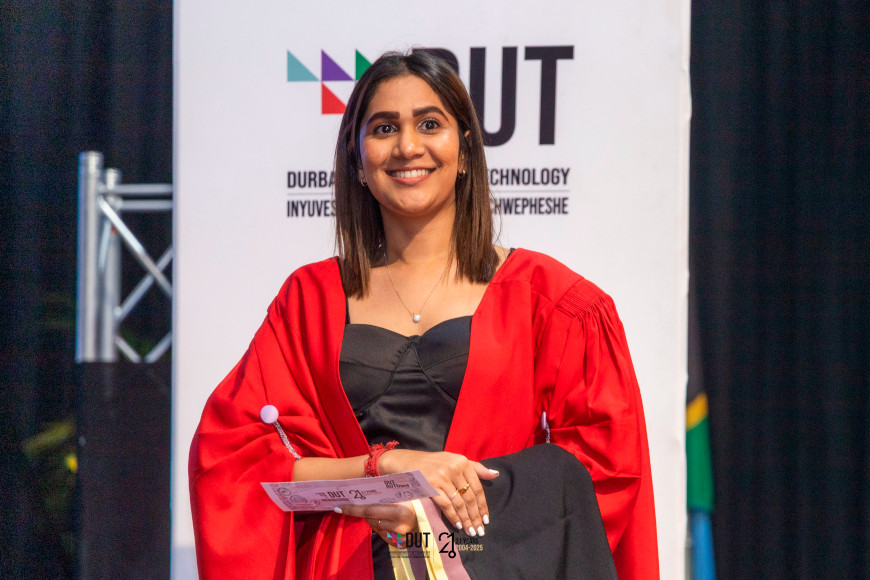Dr Riona Indhur was conferred with a Doctor of Philosophy in Biotechnology during the Durban University of Technology (DUT) 2025 Autumn Graduation Ceremony, held at the Olive Convention Centre in Durban on Monday, 19 May 2025.
A dedicated scientist based at DUT’s highly acclaimed Institute for Water and Wastewater Technology (IWWT), Dr Indhur’s research is at the forefront of innovative approaches to address water pollution and sustainability. Her doctoral thesis, titled “Synthesis, Assessment, and Application of Two-Dimensional Ferromagnetic Nanocomposites for Removal of Microplastics from Drinking Water and Wastewater Effluent,” explores the development of advanced nanomaterials to remove harmful microplastics from water sources.
Her work contributes meaningfully to the global pursuit of clean water solutions, combining cutting-edge science with a commitment to environmental sustainability.
Her research under the supervision of Professor S Kumari and co-supervised by Prof A Kumari and Prof F Bux yielded two peer-reviewed publications and 1 conference presentation. In addition, three other peer-reviewed papers have been published in this research field, and two book chapters have been accepted for publication.
In 2024 she was recognised as the Top Published Doctoral Student at the IWWT. Earlier this year (2025), she was awarded the prestigious NRF Scarce Skills Postdoctoral Fellowship. Her work has led to multiple publications in high-impact journals, such as Science of the Total Environment and Environmental Chemical Engineering, with several papers focusing on microplastics remediation and environmental nanotechnology. Presenting at international conferences, including the 14th IWA Water Reuse and Reclamation International Conference, has further solidified her position as a leading researcher in her field.
Her academic path is marked by a relentless pursuit of knowledge and impactful research. A pivotal moment in her career was aligning her research with the United Nations Sustainable Development Goals (SDGs), focusing on water sustainability. Her groundbreaking work on microplastics removal from wastewater using magnetic nanocomposites (MNCs) has provided innovative solutions to a pressing environmental problem, contributing to SDG 6 (Clean Water and Sanitation) and SDG 14 (Life Below Water).
She has always had a deep fascination with science. Receiving her first microscope at the age of six sparked an early interest in exploring the unseen world around her.
After completing her undergraduate studies, Indhur pursued an Honours in Microbiology and a Master’s in Pharmaceutical Chemistry. Her passion for sustainable science led her to focus on environmental issues, specifically water security and pollution mitigation.
However, the journey was not without challenges. As the first researcher at her institution to work with nanomaterials, Indhur had to develop new research methodologies from scratch. Resource limitations and balancing multiple responsibilities tested her resilience. Despite these obstacles, her perseverance and adaptability led to significant advancements in water purification technology.
For Dr Indhur, DUT was instrumental in her growth as a researcher. DUT’s commitment to innovation and sustainability resonated with her, enhancing her passion for addressing environmental challenges. The university’s support not only helped her develop technical expertise but also empowered her to engage in science communication, presenting her findings at international platforms and engaging with the community to raise awareness about water quality and sanitation.
“The university provided access to cutting-edge laboratories and resources. The mentorship and guidance from faculty members, especially after the addition of a nanomaterial’s expert to the institution, were invaluable. DUT’s strong research culture and collaborative environment helped her refine her techniques and approach,” she explained.
Her long-term goal is to contribute to global science policy, particularly in open science and sustainability, bridging the gap between innovative research and real-world applications. She aspires to influence global water treatment strategies and environmental policy by leveraging her research in microplastic pollution and nanotechnology.
“My long-term vision is to bridge the gap between cutting-edge research and practical implementation, ensuring that scientific advancements contribute meaningfully to environmental and societal challenges,” she said.
She also dreams of working with the United Nations as a research scientist or policy advocate, making a broader impact on global environmental challenges, particularly those related to water security.
As DUT celebrates her success, Dr Indhur stands as a beacon of excellence and innovation, embodying the Faculty of Applied Sciences’ commitment to educate, innovate and engage.
Pictured: Dr Riona Indhur gracing the DUT graduation stage.
Silindile Buthelezi/Simangele Zuma

